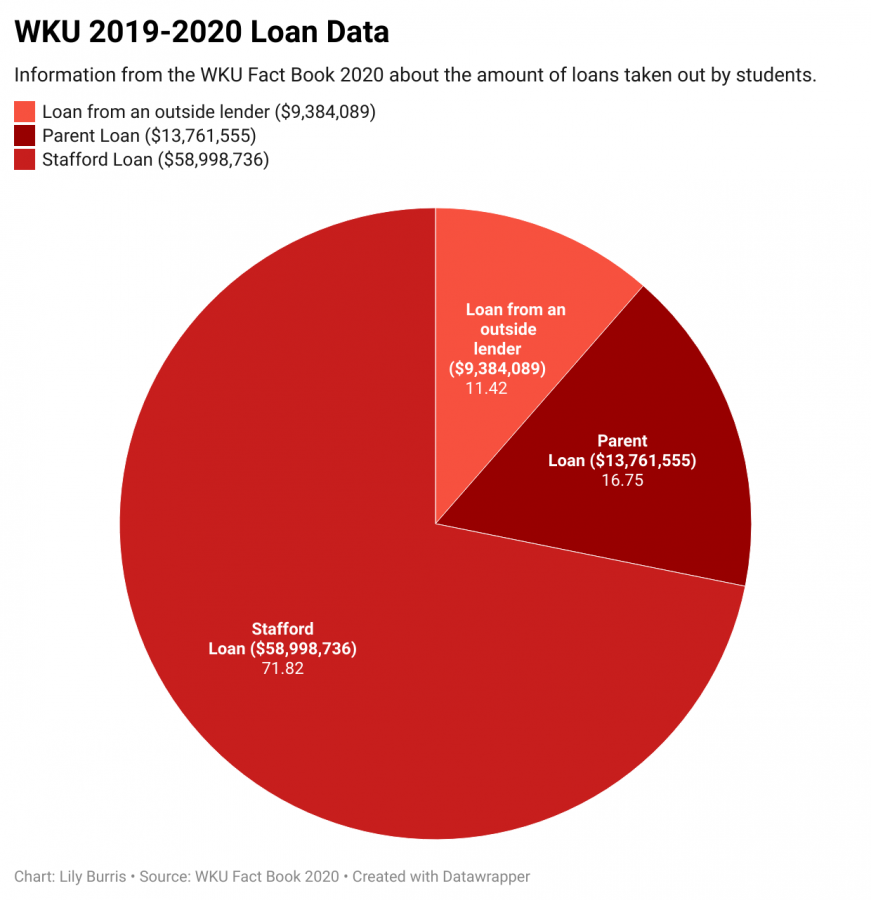New house bill to affect student loan borrowers’ rights
March 2, 2021
Editor’s note: In a previous version of this story, it was stated that private loan companies do not follow federal regulations. This is not correct and the information has been changed. The Herald regrets the error.
A new House of Representatives bill centered on student loan borrowers’ rights is being considered by the Kentucky legislature.
House Bill 239 is titled “AN ACT relating to student loan services.”
One of the sponsors of the bill is WKU history professor and State Rep. Patti Minter, who describes the bill as the “student loan borrowers’ bill of rights.” If the bill passes, it will go into effect
in 2022.
Minter said she talked to her students about what they’re deal- ing with, and one of the things that came up was the amount of student loan debt they face. Additionally, she spoke with friends in their 30s, 40s and 50s who are still paying off student loan debt.
“The commonality between all of these people that I’ve been having conversations with is that the deck is stacked,” Minter said. “The student loan industry and student loan servicers in Kentucky are not regulated.”
According to the WKU Fact Book 2020, more than $82 million was taken out in loans by students. This makes up 43% of the student financial assistance awarded in the 2019-20 school year.
The bill creates transparency around interest rates on loans and creates an office of the ombudsman for student loans, Minter said. The ombudsman acts as an advocate for student loan borrowers and could help them resolve issues with their servicers.
Other industries, like mortgage lending, have regulators to prevent and fight against predatory loan practices.
“Full disclosure, transparency, good common-sense regulation, and creating an oversight system — those are really the key things that this bill does,” Minter said.
For new student borrowers, loan servicers would have to follow the new regulations, and the ombudsman would be there to provide oversight and advocate for these students. Cur- rent student borrowers would be able to go to the ombudsman for assistance with their loans in the future.
This is the first time a bill like this has been brought to the legislation, Minter said. Twelve other states have passed laws like this, including Connecticut and New York.
“We know it works, and we know that it can help student borrowers and has helped student borrowers by leveling the playing field in other states,” Minter said. “It’s time to bring that to Kentucky, and now what I’m trying to do is build support.”
In the state, there is the Kentucky Higher Education Assistance Authority, known as KHEAA, and the Kentucky Higher Education Student Loan Corporation, known as KHESLC. These are sister agencies and share things like a CEO and board of directors.
KHEAA is the state guarantor and guarantees that all student loans in Kentucky will be paid, Meredith Geraci said, director of Marketing and Communications for KHEAA. KHESLC is the state-based private loan lender and administers private loans in Kentucky.
“We’re always advocating to the legislature to try and get more money for our grants because that money is tied to the state legislature,” Geraci said. “We’re always continuing to push for increased amounts for our grants, scholarship, and unfortunately, student aid overall has not kept pace with the increase in educational costs.”
Most loans are set to take about 10 years to pay off, but other payment plans are available. Geraci said they will always advise you to apply for
a federal loan, grant or scholarship before a private loan.
Some private loans are fixed rate loans, which means the interest rate will not change over time. Other loans are variable rate loans, which means the interest changes with the market over times. Other factors that go into paying off loans include whether or not the borrower put the loan on hold at any point.
“Our advice to borrowers is always to educate yourself on the loans, and all of the repayment options, and that we advocate for folks to borrow responsibly,” Geraci said.
Lots of different states are enacting bills like HB 239, but there’s not a lot of coordination, meaning servicers don’t have consistent legislation to follow. Geraci said servicers, like KHESLC, must keep spreadsheets of the different laws and regulations for all the different states.
KHEAA and KHESLC are borrower-centric state agencies and focus on what is good for the borrowers, Geraci said. Groups like Sallie Mae and Discover are private lenders that follow federal regulations and provide credit-based and unwritten private student loans.
“Student debt has increased as the cost of higher education has increased,” Minter said. “The state government has a responsibility to appropriate more money to higher education, so that tuition rates can be reduced. But until that happens, people will be borrowing money for their education, and so people borrow a lot of money for education.”
Assignment Editor Lily Burris can be reached at lily.burris203@topper.wku.edu. Follow her on Twitter @ lily_burris.














